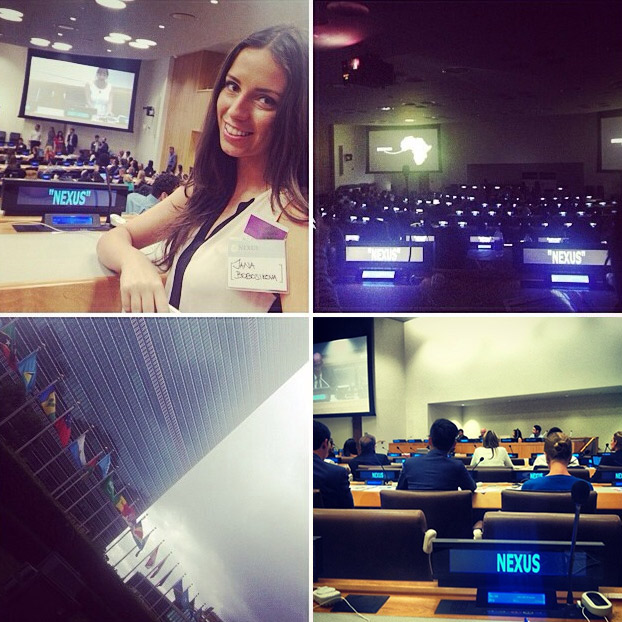
Jana Bobosikova ’10 is a graduate of the Barcelona GSE master program in International Trade, Finance and Development.
I was sitting in the Conference Room 1 at the United Nations in New York in summer 2013 amidst the Nexus Global Youth Summit attendees, listening to the opening address from Roland Rich, Executive Head of the United Nations Democracy Fund. The message I was hearing was clear and bold: we are here to take action. Not “we” as in policy makers and government funded multilateral agencies” but rather “we” as in Nexus, the global movement of Doers from the circles of the largest philanthropists, hardest working and most daring social entrepreneurs, investors, international advocates and NGOs.
Part of me was elated: so many influencers, all on the same page, with substantial financial and human commitment to contributing to making the world a better place!
Another part of me, the one I cultivated through the study of economic analysis at the ITFD program at Barcelona GSE, was a bit nervous about so much “good doing”.
I felt too aligned with the work of my former professor Xavier Sala-i-Martin and William Easterly that suggest that much of external help to date has had none or negative effect on socio-economic growth to simply embrace the possibility that Nexus Youth Summit was different and effective.
I sent a mental greeting to Prof. Antonio Ciccone and his often restated quest for the “one-handed economist” – creating one best solution with all relevant sets of variables – conclusions with no caveats “on the other hand.” Had I found them? What were the Nexus development solutions that gathered at the UN?
Let’s see:
- We have been conditioned to include savings as a basic variable for economic growth models. At Nexus, Aron Ping D’Souza felt so compelled by the meeting of Sir Richard Cohen at an earlier Nexus Europe Youth Summit that he started an impact investing annulation fund, using the best practice from classic and impact investing to target over AUS$1.7 trillion pension funds to a creating a 2.0 return for the economy.
- We learned about girls’ education challenges in developing countries. One of Nexus’ members, Nikki Agrawal, invested in researching and launching menstruation-absorbing underwear to address one of the most significant school attendance problems for girls.
- We studied about how to create policies that incentivize investing into R&D for a healthier global population. At Nexus, it was a great honor to be joined by Jake Glaser, the son of Elizabeth Glaser who pioneered and prompted research and development in pediatric AIDs in early 1990s. It was the one case of AIDS transmission via blood transfusion during Elizabeth Glaser’s giving birth and her subsequent fight to save her children that has kickstarted the largest research and movement on eliminating pediatric AIDS – a vision that is now becoming a reality.
I could probably keep going and catalogue the amazing encounters and inspiring efforts of the hundreds (!) of international innovators, family offices that fund some of the largest projects as well as startup social entrepreneurs – that make up Nexus.
And maybe I should, so that the passion and commitment of the Nexus movement and the research and rigorous analysis from the realms of development economists could start catalyzing into aligned efforts to improve international trade, finance and socio-economic development.
To learn more about Nexus and its initiatives, visit the Nexus website.
To discuss further how your passion and work can materialize in an initiative, email Jana.
